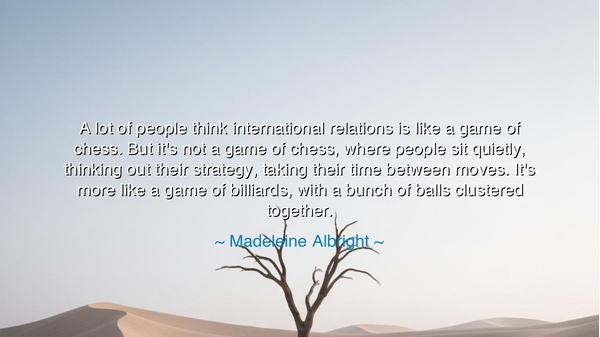
A lot of people think international relations is like a game of
A lot of people think international relations is like a game of chess. But it's not a game of chess, where people sit quietly, thinking out their strategy, taking their time between moves. It's more like a game of billiards, with a bunch of balls clustered together.






Madeleine Albright, the first woman to serve as United States Secretary of State, once spoke with clarity and force: “A lot of people think international relations is like a game of chess. But it’s not a game of chess, where people sit quietly, thinking out their strategy, taking their time between moves. It’s more like a game of billiards, with a bunch of balls clustered together.” These words, drawn from her years of navigating the stormy seas of diplomacy, tear away illusions and reveal the reality of power, conflict, and negotiation among nations.
The meaning of her teaching lies in the distinction she makes between chess and billiards. In chess, each move is deliberate, slow, and isolated, with players contemplating the board in silence. It is an orderly duel where the pieces do not move unless touched by hand. But in international relations, there is no such stillness. One action, like the strike of a billiards cue, sets many forces in motion at once, colliding and ricocheting in ways the striker cannot fully control. The movement is not singular, but chaotic; not linear, but interwoven. Thus, Albright reminds us that world affairs are not played in calm silence, but in constant turbulence.
History itself confirms her wisdom. Consider the outbreak of the First World War. Leaders believed they were making careful moves: an alliance here, a declaration there, a mobilization to show strength. Yet these choices struck the table like a billiard’s cue. Nations collided, treaties clashed, and soon the whole cluster of Europe was in motion, spinning uncontrollably into war. What seemed at first like a deliberate contest of wills became an uncontrollable storm, proving Albright’s point that the board of nations is never as calm as a chessboard.
Another witness is the story of the Cuban Missile Crisis. In October 1962, the United States and the Soviet Union seemed locked in a chess match, each weighing the next step with care. But the truth was closer to Albright’s billiards table. A move in Cuba caused ripples in Turkey; decisions in Moscow collided with reactions in Washington, while other “balls”—smaller nations, intelligence leaks, military commanders—ricocheted unpredictably. The world did not stand still for neat calculation. It was chaos barely contained, and catastrophe was only averted by wisdom, restraint, and fortune.
The lesson is this: in the affairs of nations—and indeed in the affairs of life—we must not be lulled into believing that the world unfolds in calm, predictable order. Every choice we make collides with countless others, sending ripples outward that strike in ways we did not foresee. Thus, wisdom requires humility. The strategist who imagines he controls all outcomes is a fool; the true leader anticipates turbulence, prepares for collision, and remains ready to adjust as the pieces scatter.
In practice, this means cultivating flexibility of mind and resilience of spirit. Whether in diplomacy, business, or personal life, do not cling to the illusion of total control. Instead, prepare for the ricochet, the unintended consequence, the chain reaction. Like a billiards player, learn not only to strike but to watch how all the balls scatter, and to adapt with speed and clarity. This is the mark of a wise leader and a steady soul.
Therefore, children of tomorrow, remember Madeleine Albright’s words: life and international relations are less like chess and more like billiards. Do not imagine that you sit at a calm table with all the time in the world. Instead, recognize that the world is in motion, that one strike sets many pieces rolling, and that wisdom lies not only in the move itself but in how you respond to the chaos it creates. Walk with patience, act with courage, and above all, remain humble before the unpredictable nature of the game of life.






AAdministratorAdministrator
Welcome, honored guests. Please leave a comment, we will respond soon